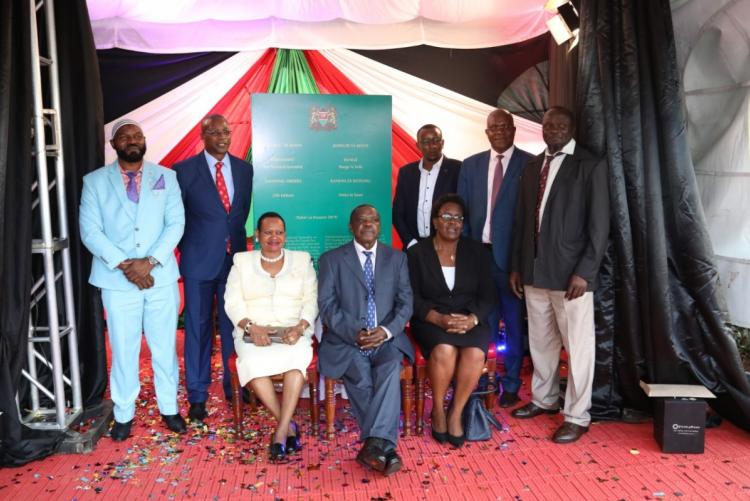University of Nairobi’s dons were part of the task force that developed Kiswahili and Bi-Lingual versions of the National Assembly Standing Orders which were unveiled by President Uhuru Kenyatta.
From UoN, Prof. Iribe Mwangi, the Chairman, Kiswahili Department was the team leader of Kiswahili experts while Dr. Prisca Jerono and Dr. Nyachae Michira were members of the taskforce.
Other dons incorporated in the project were Dr. Robert Oduori (Moi), Mr. Vincent Magugu (Moi), Prof. Kitula King'ei (Kenyatta) and Dr Miriam Osore (Kenyatta).
The team of experts also included Prof. Clara Momanyi, Mr. Nuhu Bakari a renowned Kiswahili commentator and poet and Tanzania’s Baraza la Kiswahili (Bakita). There were also legal minds from Parliament as well as experts in Parliamentary Procedures led by Mr. Kipkemei Arap Kirui, who was the leader of the task force.
“This is the second major milestone towards the use of Kiswahili parliamentary proceedings after the first one in 1974 which was undertaken following a directive from the founding father of the nation Mzee Jomo Kenyatta,” revealed Hon. Justin Muturi, the Speaker of the National Assembly. “The Kiswahili terminologies had to match the English version of the same in respect to legal meanings and this made the task difficult but the team ensured they lived to deliver the document.”
UoN's Prof. Iribe Mwangi who lead the team
of Kiswahili experts receives copies of the
Standing Orders from Kipkemei Arap Kirui,
the Parliamentary Team lead.
President Kenyatta unveiled the Kiswahili version of Parliamentary standing orders dubbed Kanuni za Kudumu Za Bunge la Taifa after addressing the joint sitting of Parliament and delivering year 2020 State of the Nation Address on Thursday, November 12, 2020 as per the requirements of the Constitution. The unveiling followed the establishment of a Kiswahili register.
UoN’s Vice-chancellor Prof. Stephen Kiama was an invited guest in Parliament during the unveiling ceremony of the standing orders. Before the unveiling ceremony, the Vice-chancellor and the experts were given a special mention by the Speaker at the State of the Nation Joint Sitting of Parliament.
The team behind the translation took over one and a half years with an aim of developing Kanuni za Kudumu that is aimed at promoting use of the national language in Parliament. The National Assembly leadership commended the professionals "for undertaking a patriotic duty for the Republic."
“As is normal with most legal documents, the English version of the Standing Orders has many long and arduous sentences which make drafting and understanding complicated. These long sentences proved challenging during translation,” explains Prof. Iribe Mwangi. “Our task involved remaining as faithful as possible to the original version given the confusion a departure would cause. We learnt that many words have very specific meaning in legislative language and we had discussions on words considered normal such as ‘table.’ Because of these peculiarities, some translations may not appear normal to a Kiswahili speaker, but the gist of the meaning had to be retained.”
The translation is in line with the dictum that recognizes Kiswahili, English and sign language as the official parliamentary languages.
- Log in to post comments

